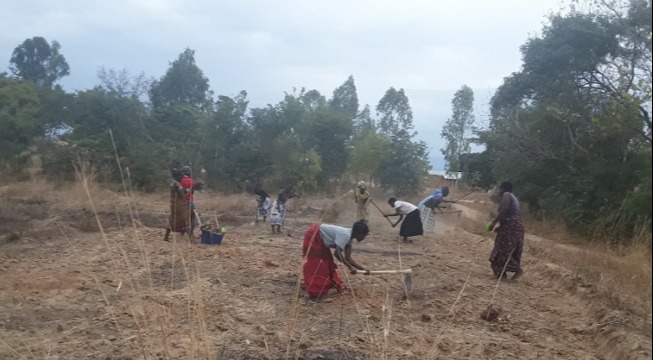Action Training Graduate’s Bold Plan to Reforest Malawi
 Community members working on the Kasitu Reforestation Project in Malawi, Africa.
Community members working on the Kasitu Reforestation Project in Malawi, Africa.
Pachamama Alliance community leader Taonga Chirwa has developed a reforestation initiative, called the Kasitu Reforestation Project, in Malawi, Africa to address the impacts of the climate crisis in his community. He has formed a local community group to move the project forward through powerful collaboration and community engagement. Their goal is to plant 14,000,000 trees by 2030 and transform the land into regenerative land, which will position the local communities to be more resilient in the face of climate change.
Forming a Community Group to Address Deforestation
After taking the Awakening the Dreamer and the Game Changer Intensive courses, Taonga was inspired to make a difference in the world and created a local Pachamama Alliance community in Malawi.
Taonga then participated in the Introduction to Community Climate Action Training, which motivated him to take on a project with his local community group. While taking the Training, Taonga and his team decided to focus their project on regenerating the land through reforestation. Much of the land throughout Malawi has been deforested, largely due to increasing development and energy consumption. This has only exacerbated the impacts of the climate crisis for local communities and for the land that so many depend on.
Taking Climate Justice Action as a Frontline Community
Taonga’s community is on the frontlines of the climate crisis, as they’re already experiencing extreme heat and a number of other environmental challenges that impact the community’s daily life. By developing the Kasitu Reforestation Project, Taonga and his team are taking the lead in addressing these challenges and creating a more resilient community.
Reforesting the land will help draw down carbon dioxide in the atmosphere and produce a much-needed cooling effect. The additional tree cover will also help rainwater to better absorb into the ground while facilitating water irrigation, reducing the risk of both flooding and drought. At the same time, reforesting the land will also restore natural habitats for other animals and insects.
Soil erosion has become another major concern, as dams have eroded the surrounding land. This has resulted in food insecurity, as Taonga’s community is losing land needed for farming and food production. Taonga and his team plan on planting a variety of fruit trees that will provide food throughout the year for members of the community. They also plan on planting other trees like pine and eucalyptus so that community members—particularly the women—no longer have to travel far for firewood.
Many of the environmental challenges facing the community particularly impact the women, for many of them are the caretakers of their households. They must often travel long distances to procure water and firewood for cooking, and must find ways to overcome food insecurity to feed their families. For Taonga, having a strong representation of women on his team is important, given the ways in which the climate crisis directly impacts their unique roles within the community.
A Bold 5-Year Vision
Taonga and his team have a bold 5-year vision for the Kasitu Reforestation Project that includes expanding the work to others.
They hope to inspire nearby schools and churches to adopt similar reforestation efforts, and want to see their project become a model for others to adopt in their own communities. By spreading this work, they hope to support the creation of green communities everywhere.